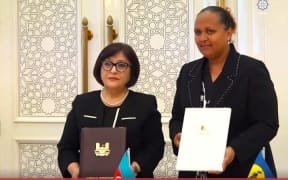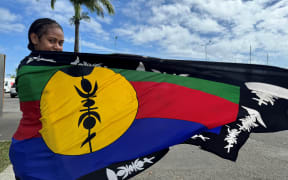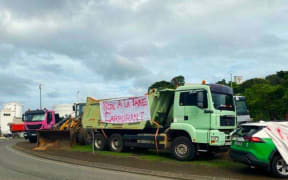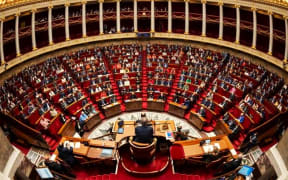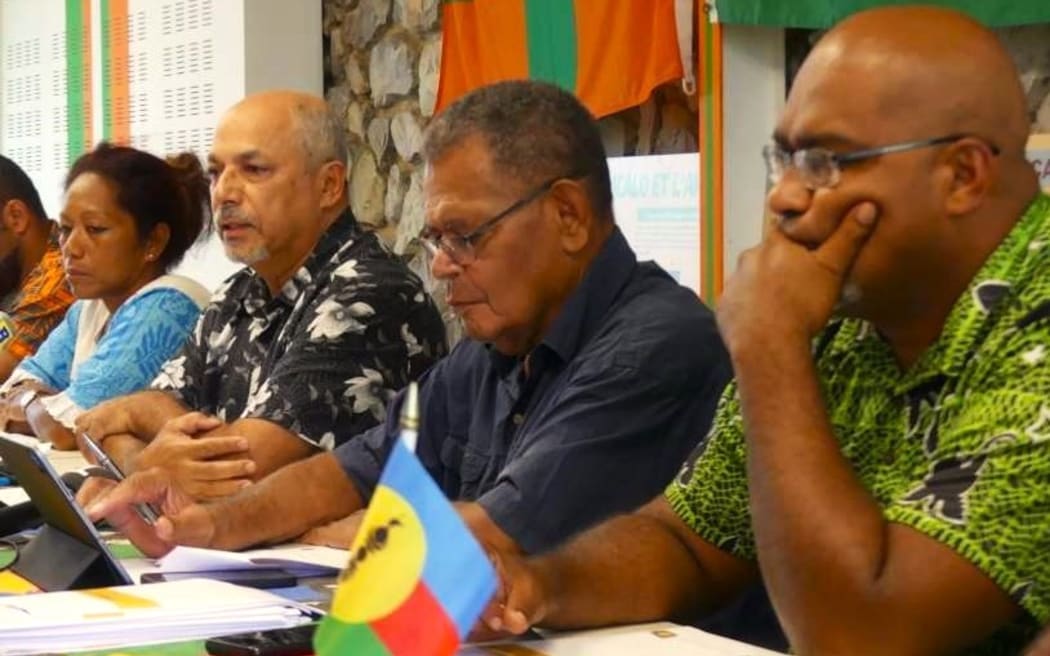
Union Calédonienne holds press conference on Monday 29 April 2024 in Nouméa. Photo: LNC
Analysis - A fresh battle to amend the French Constitution regarding New Caledonia voters' eligibility has already started in Paris, ahead of debates at the National Assembly on 7 May and a vote on 13 May.
The constitutional bill, which has been endorsed on 2 April by the French Upper House (the Senate), but in a slightly amended version, now has to undergo the French Lower House's vote.
If it is endorsed by the National Assembly, a joint sitting of both Houses (the Congress) could be summoned to meet as early as 27 May.
For starters, on Monday 29 April, the French Lower House's Law Committee pre-auditioned representatives from all represented parties, as well as the motioner for the Constitutional amendment, French Home Affairs and Overseas Ministers Gérald Darmanin.
During the session, the Rapporteur, New Caledonia's elected MP Nicolas Metzdorf, told media he was confident that, after hearing the voting intentions from all represented caucuses, there would be enough support (especially from the right-wing French parties) for the controversial amendment to pass the vote on 13 May.
If this was the case, there could be two possible scenarios: the amendment (as modified by the Senate) is passed in the same form, or (following the "shuttle" mechanism between France's two Houses) it is passed with new modifications from the National Assembly, in which case it has to return to the Senate for another vote.
The French government-proposed change intends to modify the rules of eligibility for voters at New Caledonia's local elections (for the three provincial assemblies as well as the French Pacific entity's Congress).
From the current restrictive rules known as the "frozen" electoral roll, allowing only people who have resided in New Caledonia before November 1998 to vote(as prescribed by the 1998 Nouméa Accord), the French government intends to introduce a "sliding" roll, still restricted, but allowing any French citizens to vote there - on condition that they have been living in New Caledonia for at least ten consecutive years.
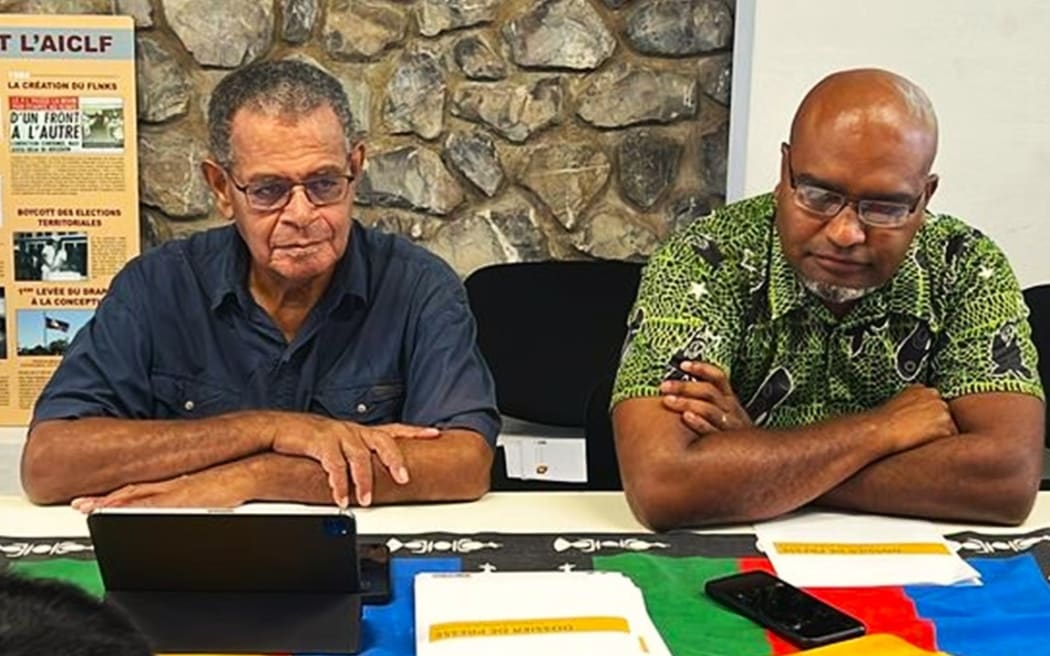
Union Calédonienne President Daniel Goa and spokesman Dominique Fochi speaking at a press conference on Monday 29 April 2024 – Photo: NC la Première
'Frozen' or 'sliding'?
The text has been at the centre of growing tensions in New Caledonia, where pro-independence parties have denounced what they regard as an attempt to reduce the voting weight of the indigenous Kanak people, and therefore make them a minority on their own land.
The opposition has taken many shapes, with the Union Calédonienne (UC, one of the main components of the pro-independence umbrella, the FLNKS) regarded as promoting the most radical approach.
It has revived a so-called "Field Actions Coordination Group" (CCAT, made up of pro-independence trade unions and parties not belonging to the FLNKS) and, over the past few months, has organised several demonstrations and marches.
The largest of those marches took place on April 13, when UC and its CCAT managed to mobilise over 20,000 participants in downtown Nouméa, while at the same time, a few streets away, the pro-France movement gathered another estimated 20,000 supporters of the French Constitutional reform.
UC demands that the French Constitutional amendment be withdrawn altogether, and refuses to talk with Darmanin (who has travelled to New Caledonia seven times in the past 18 months) or take part in a round-table of political parties in order to produce an agreement that would serve as the successor to the now-26-year-old Nouméa Accord.
The 1998 Accord, which has served as a de-facto Constitution for New Caledonia until now, contained several provisions pertaining to a gradual transfer of powers from France to local authorities.
It also contained provisions for three successive referendums on self-determination to be held.
These took place in 2018, 2020 and 2021 and three times, a majority of "no" to independence prevailed.
However, the last of those three referendums was boycotted by the pro-independence movement, which later said it now contested the validity of the whole process.
The possibility of calling on the International Court of Justice to rule on the matter had once been raised, but has so far not eventuated.
In the case of three consecutive negative responses to the self-determination question, one of the final stages of the Nouméa Accord's implementation was for local political parties to hold inclusive bipartisan meetings in the view of "the situation thus generated" and possibly agree on a forward-looking basis for what could become a successor to the 1998 Accord.
Accordingly, over the past two years, attempts to bring every local party at the same table for these talks have failed; and it is now widely regarded that the negotiation process has stalled, even though attempts have been made in several, non-inclusive formats.
Hence another suggestion, sometimes even a demand, gaining momentum: that France send a high-level, "neutral" "dialogue mission", which could be headed by top members of both the National Assembly and the Senate, to re-start the local discussion process.
The idea appeals to most components of the pro-independence movement, including the more moderate members of the FLNKS, such as PALIKA (Kanak Liberation Party) or the UPM (Melanesian Union for Progress).
Constitutional amendment could be voided
Another twist to the French government's Constitutional bill is that, if local political parties arrive at a consensual agreement on New Caledonia's political future (initially before 1 July) then the whole amendment process would become void; and the locally-produced text would be considered as a priority basis for an amendment to the French Constitution.
This, again, was regarded by pro-independence parties as a form of pressure on them and the sentiment that France was no longer neutral on the whole New Caledonian issue.
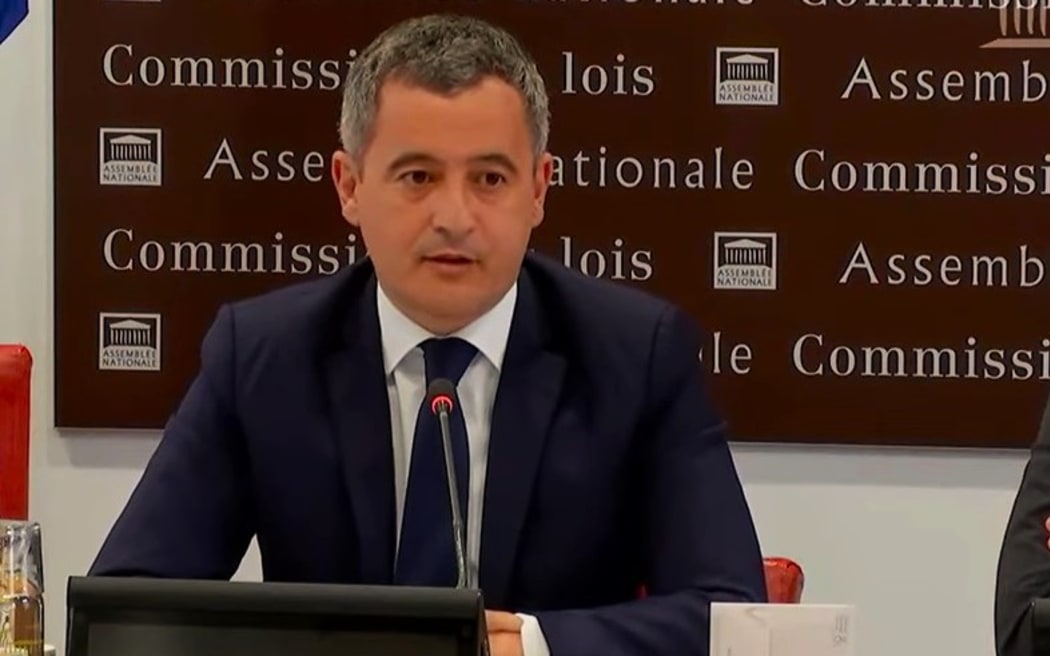
French Home Affairs and Overseas minister Gérald Darmanin speaking before the French National Assembly's Law Committee on 29 April 2024. Photo: Assemblée Nationale
Darmanin also explained at every stage what he perceived as a necessity for those electoral changes to be made.
He maintains the Nouméa Accord's electoral restrictions for local elections were put in place on a temporary basis, and were never made to last forever.
He also says the changes are a form of going back to a "minimum of democracy" that would enable about 25,000 citizens to cast their vote in accordance with France's democratic values and international commitments.
Political atmosphere in New Caledonia has radicalised
Over the past months, the political atmosphere in New Caledonia has steadily radicalised on both sides.
Pro-independence parties, such as UC, have openly threatened to boycott the next provincial elections (initially scheduled to take place in May, but now postponed until December 15 "at the latest"), if they were to be held under the new voter eligibility conditions.
Pro-France parties, such as Le Rassemblement and Les Loyalistes, while demanding that their long-time residents' voices be recognised on the principle of "one man, one vote", have also asked Paris to hear their plea - and also threatened to "cause trouble".
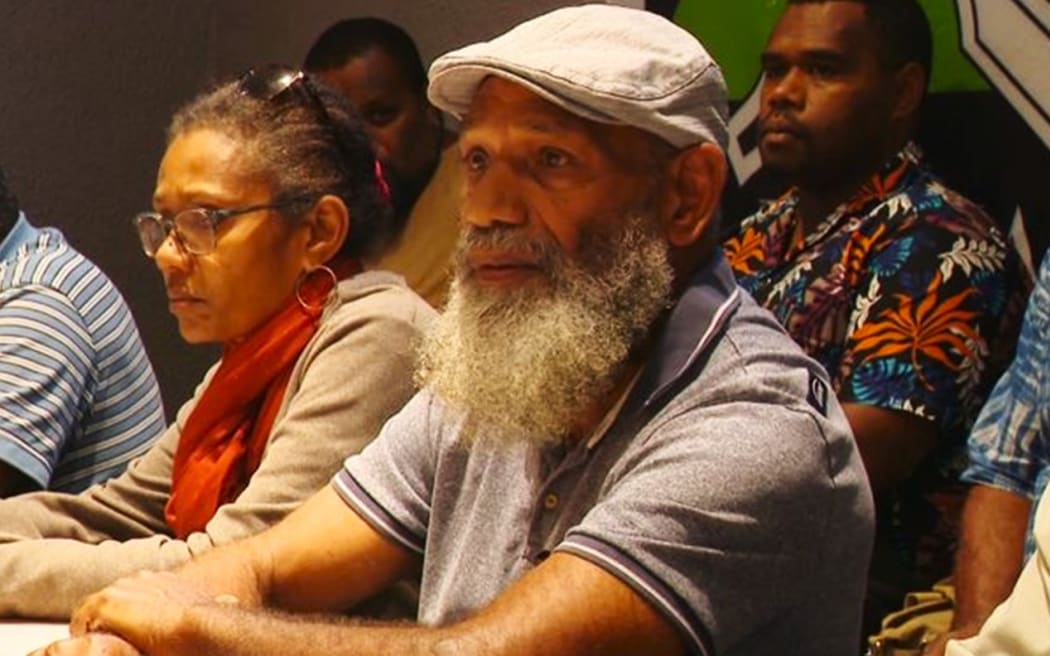
PALIKA spokesman Charles Washetine appeals for calm at a press conference on Friday 26 April 2024. Photo: NC la Première
PALIKA calls for calm
During a press conference on April 26, PALIKA (another major, but more moderate component of the FLNKS) called on everyone for calm and moderation.
PALIKA spokesman Charles Washetine said everyone should "remain vigilant and discerning", so as to keep away from "something that could be irreversible", and "compromise future talks" aimed at identifying the best way to conclude the Nouméa Accord.
"No one should take any step that could prevent us from moving forward because the electoral roll issue can also be addressed as part of those wider talks," he told reporters.
"So we too (PALIKA) are asking that the current (Constitutional amendment) amendment text be withdrawn."
This, he said, would remove the pressure and talks could resume in a "peaceful atmosphere".
Returning MPs plead for 'dialogue mission'
Meanwhile, on Monday in Paris and also at the National Assembly, MPs from an "information mission" returning from a fact-finding tour of all of France's overseas territories to study how their status vis-à-vis France could evolve in future, presented their report with a special emphasis on New Caledonia.
They stayed in New Caledonia from 11-15 March.
The three MPs pleaded in favour of an "impartial dialogue mission" to help New Caledonia's politicians meet and arrive at a comprehensive agreement that would allow New Caledonia to move forward.
The MPs, in this report, also mention what they perceive as "the real risk for inflammation", even though they also express confidence that "a deal remains feasible within a reasonable timeframe".
"We left New Caledonia worried of the rise in tensions, radicalisation on the part of some ...All this within the context of an armed population and unhealed wounds," they wrote.
They also mentioned the risk of a boycott of future provincial elections from pro-independence parties, if the electoral amendment changes were to be enacted.
They also mention the particularly sensitive context in New Caledonia, with a backdrop of economic and social crisis, mainly due to the difficulties faced by the nickel industry.
France's minister of finance Bruno Le Maire, after visiting New Caledonia in November 2023, has offered a €200 million emergency plan to rescue embattled nickel mining companies there, but the "nickel pact" is tied to a commitment from companies and political authorities to a train of reforms to reduce the cost of New Caledonia's nickel.
From economics to politics, the nickel plan is now regarded as a political issue, and it still has not been signed by New Caledonia's President Louis Mapou.
Instead, the local Congress has chosen to set up a "special committee" to re-examine the pact, which critics accuse of taking away New Caledonia's sovereignty on the precious mineral.
The "Nickel Pact" could now potentially become a precondition to successful political talks on New Caledonia's future, just like the "Bercy Accord" was, back in 1998.
Signed in February 1998, the Bercy Accord was the result of talks between the French Ministry of Finance and New Caledonia's parties.
It agreed at the time to the sale of the nickel-rich Koniambo massif to the Northern Province of New Caledonia, in a move to "re-balance" the French territory's wealth between the North (mostly populated by indigenous Kanaks) and the more affluent South, where the capital Nouméa is located.
This re-balancing act was regarded as a core value of the Nouméa Accord; it was de facto a preliminary to its signing just a few months later.
Union Calédonienne lobbying from Paris to Caracas
Union Calédonienne on Monday also held a press conference after an "Extraordinary Steering Committee" held at the weekend.
President Daniel Goa said his party supported the notion of a French dialogue mission and remained opposed to the "forceful" methods used by France.
But he said UC now intended to resume dialogue with local political parties.
As part of political lobbying ahead of the National Assembly debates next week, UC also announced a delegation of its members, including CCAT elements, was flying this week to France.
UC vice-president Gilbert Tyuienon told journalists: "This is to sensitise and alert French MPs of the risks of 'unfreezing' (New Caledonia's) electoral roll and of using these forceful manners."
Asked if they would meet Darmanin while in Paris, UC said they would not.
Another UC delegation was also on its way to Venezuela, to take part in a UN regional decolonisation committee (May 14-16) in order to network and try to garner international support.
'We don't want the same mistakes'
"If the electoral roll is unfrozen, we really cannot see how those provincial elections could take place in good conditions," Tyuienon said.
"We are alerting because everyone knows what happened in the past and we don't want the same mistakes to be made again."
Forty years ago, in 1984, pro-independence parties refused to take part in territorial elections and, to symbolise this stance, prominent leader Eloi Machoro smashed a ballot box with an axe.
This was the starting point of half a decade of a quasi civil war that only ended in 1988 and the signing of the "Matignon-Oudinot Accords" between pro-independence and pro-France leaders Jean-Marie Tjibaou and Jacques Lafleur.
Next week, ceremonies will take place in New Caledonia to pay tribute to pro-independence leaders Jean-Marie Tjibaou and Yewene Yewene, who were both shot by a hard-line pro-independence militant, on May 4, 1989.
Ten years later, in 1998, the Nouméa Accord was signed.
